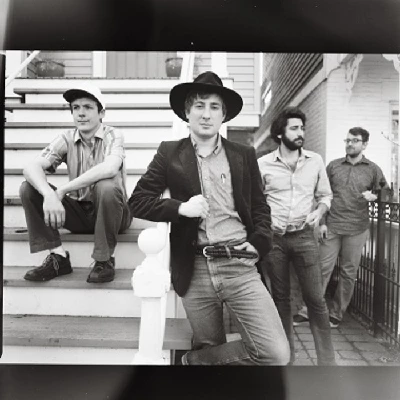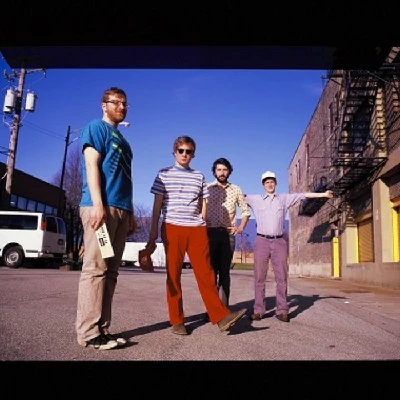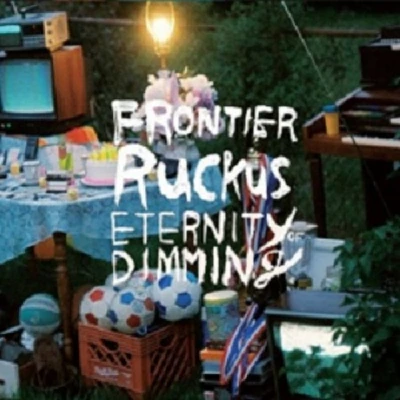published: 24 /
3 /
2013

Ben Howarth talks to Michigan-based Americana band Frontier Ruckus at a show in London about their new double album, ‘Eternity of Dimming’
Article
Every aspect of Frontier Ruckus’ third album ‘Eternity of Dimming’ marks them out as a brilliantly unusual group. A double album, where the list of instruments played is longer than many band’s lyric sheets, it is a dense, twenty track collage – with glistening pop songs rubbing shoulders with fragmented epics merging multiple song segments into one. Each song is a short story rich in detail and rhyming wordplay – fans of Okkervil River and the Mountain Goats will feel right at home, as will lovers of modern alt-country. Released in the UK by Loose records, it is the first of their albums to get a full European release, and recently garnered a glowing review in ‘Uncut’ magazine.
Singer and songwriter Matt Milia met banjo player David Jones in high school. “David played the banjo since he was a boy, because his dad is from Georgia.” Matt tells me. “That’s the main thing any interviewer needs to know about him!” In college he then lived in the same dorm as multi-instrumentalist Zachary Nichols and drummer Ryan Etzcorn (known to the rest of his band as ‘Smalls’). With Jones at another college an hour down the road, Frontier Ruckus began playing college shows and gradually started going on longer and longer tours.
“Somehow we managed to play Europe.” Matt explains. “The internet allows you to be heard in some unlikely places, and we ended up being contacted by a festival in Norway, who wanted us to come and play for them. So then, as we were flying all this way, I looked for a show in London. I called up Tim Perry at the Windmill, because I saw that some other band had recently played here, and – though he had no reason at all to book us – he listened to our MP3s and gave us a show. Then Tim made a lot of things happen for us because he liked us so much.” “Thinking about it makes me want to buy Tim a drink.” David adds. “He’s a good guy”.
Having now been back several times, making sure to play another show with Tim each time, Frontier Ruckus band started their latest European tour at the beginning of March with another sold-out show at the Windmill, ending the show performing unplugged in the middle of a sweaty but wildly enthusiastic crowd. A few hours earlier, we had perched in a shed behind the pub (until recently an outdoor smoking area), and discussed how Frontier Ruckus had formed and how they came to make a twenty track double album.
PB: I’ll start off with a question that you have probably already answered hundreds of times – which is what made you want to record a double album at a time when albums are typically getting shorter rather than longer?
MM: Simply that we wanted to. You know, there was no real calculated motivation behind it. It was just that I had that many songs, which was a product of having been on the road for the best part of two years since our previous release ‘Deadmalls and Nightfalls’. So a lot of time had accumulated and gone by, and I had a whole set of songs that were inherently cohesive, in that they came from the same period of my life.
ZN: Though there is one song on there that was much older, but I demanded that it be on the record anyway.
MM: But it’s a very short song - we recorded it through a 1980s Sony Camcorder. But we did know that there is a stigma, or an allergy, in music today against long and hard-to-digest media, because people’s attention spans are generally shorter these days. But it didn’t cause too much reluctance on our part because we’re the kind of band that makes music for ourselves first and foremost.
We’re very grateful for other people’s appreciation of what we do, but it is very much a by-product. One of the attractions of making a longer record was the increased dynamic range. You have more chance to have a range of frequencies, and then repeat patterns or not repeat them as appropriate.
PB: Have you had much feedback? What do people think of it?
MM: Oh yeah, we’re in a music industry where people send these things out for reviews, and I see them come in sometimes. There have been some hyperbolically amazing reviews, where people say it is the best record of all time, and some where they’ve not said anything like that – “it’s too long, too many words and his voice is too much like this or that”. But, for the most part it is what I would expect and the people that have liked us thus far continue to like similar things on this album.
RE: It seems to be a really big hit amongst people who already like our other records…
ZN: And that’s all we can hope for. We did this album for people who have a background with us…
MM: Although you get some really sweet messages as well – “where has this band been all my life?” and that kind of stuff. So it is turning on some new people too. It’s not the record that is necessarily designed to turn new people on – it’s not a distilled version of what we do, it’s a very intense version – us to the max. Maybe we’ll do that on the next record, dial things down a bit and make something a little more accessible.
PB: Of course, for those of us in Europe, this is the first we’ve heard you. It’s the first album to be given a full release over here.
MM: Indeed, and thanks to the good people of Loose Music!
ZN: The other albums will feel like prequels. There are lots of references on each album to what has come before.
PB: Am I right in thinking that “Eternity of Dimming” begins with the same chord sequence as the last track on the last album?
MM: Yeah. I like doing things like that. It’s as Neil Young said “all one body of work.”
PB: Have you started planning for the next album?
MM: Yeah, it’s already written, mostly. That’s the way records go, for a songwriter. So much time is injected into the process – ‘Eternity of Dimming’ was completely done a year ago, and then it is just a long wait. We’re excited for the next record – we’re just about to start arranging the songs as a band.
PB: Matt, you have a particularly wordy lyrical style – there is a mix between quite personal, vivid images in the songs and then wordplay where, essentially, you are having fun and challenging yourself as a writer.
MM: I think that playfulness is maybe the main reason I write to begin with. I mean, there is a huge personal catharsis in every line, but I could probably achieve all of that personal catharsis with less. But it is ‘the more’ where I have fun. I embrace that – I call it self indulgent and it is, but art is meant to gratify the artist first and foremost. But I really own up to that, because I had so much fun making this record.
Somehow, my enjoying the process always seems to intensify the words themselves, I don’t just do it for the sake of it. The wordplay all reflected the central point each line of the song is trying to make.
PB: I suppose that all comes back to the point you made earlier about doing a double album – because you did that because it was the right thing for you as a band and you wanted to.
MM: Right, it is a weird to think of the idea of a standardisation of how long an album should be, because the format of art has always changed throughout history and it should.
ZN: How big should a painting be?
MM: Exactly! But, we’re not trying to make a point with that. It’s just that I’ve enjoyed double records my whole life. Some of my favourite records are double albums. Like Bob Dylan’s ‘Blonde On Blonde’, something that is super long and super-dense. We wanted to make one, so we did.
PB: Will you make another double album?
MM: Probably not with the next one. I also like short pop songs, short albums. I’d like to use this album as a contrast – now that we have a long record, it might be more exciting to make a tight and terse, accessible punch to the face. That would almost be more of a challenge now. It’s certainly very hard to do. Editing isn’t my favourite thing to do. I like dense and long things.
RE: (Rhetorically) How many songs for the next record do you have already?
MM: Good point. It’s growing and growing.
PB: Were there leftovers from the last album, or did recording twenty songs cover everything.
MM: I think there were a few. It was 24 songs originally. I do have a growing catalogue of bastard offspring songs… which will eventually become my solo record (Laughs).
I like to demo everything though. We are actually about to release a very extensive catalogue of almost every demo we have ever done, because I love the idea of everything being out there. Why not? We have the internet website where it can go. This demo collection will just be for those that are really keen, just for downloading. But we want to record more regularly, and not wait two years between each album. Two records out every year would be amazing.
ZN: Labels have a word for that though, cannibalization. “Don’t cannibalize yourself”.
MM: But we are in a comfortable place where we are surrounded by people who put the art first, so I think we can release more.
PB: “Eternity of Dimming” doesn’t sound like a singer-songwriter album where the band has just stuck stuff over the top of the songs…
MM: Yeah, I would hope not. But these guys can explain that better than I can…
ZN: Yeah, well Matt writes the super-majority – all the lyrics and the main vocal melody and the chord structure. But the rest of us take that and come up with ideas of what we should do with it.
MM: You can do a lot with a chord progression – pure texture or instrumentation. Zach and Dave really add a lot to what I do.
ZN: Counter-melodies are my favourite thing to do, adding extra tunes and deciding what instruments to use.
DJ: Sometimes the songs might be a collection of segments that Matt has written, and we try to find a way to take them and make them into a fully arranged piece. Until we all do that together, it’s kind of an unedited work.
RE: And then I add drums to it, and make it a jam.
ZN: Well, the drums add real texture – I’m thinking of ‘Nightmares and Space’. It wouldn’t be a song without Smalls’ little drum fill in the bridge.
RE: In fact, I try to not to just make it a jam, actually. I try and play along with and off of the things that they are doing as well, to try to accentuate certain accents within a phrase and to make sure that the wonderful things in the songs really pop out.
DJ: Smalls and I are finding out more and more that drums and banjo are really made for each other. I have become a strange mix of banjo player, lead player and rhythm player. When I was really young, I learned as a bluegrass player, but there is so little of that in what we do now.
RE: It is getting to the point where I often have barely anything other than banjo in my monitor!
MM: Our live sound is constantly in flux, mainly because of Zach. It seems that he always has free hands, and is finding new ways to play more and more different instruments on the songs, so that keeps things really fresh.
PB: Do you all have similar musical influences?
MM: Our musical influences have all rubbed off on each other, more and more. We’ve all been effectively living together for several years now.
RE: I think when the band first started the only thing we all had in common was Neil Young and maybe Neutral Milk Hotel. But more and more we intersect.
DJ: There is a big intersection. If you put all our musical tastes in circles, and overlapped them, then the bit where they all intersect would have a pretty large amount of music in it.
RE: We should draw that! That’d be really interesting to do…
PB: Thank you.
Band Links:-
http://www.frontierruckus.com/
https://www.facebook.com/frontierrucku
https://twitter.com/frontierruckus
http://frontierruckus.tumblr.com/
https://www.youtube.com/user/frontierr
http://music.frontierruckus.com/
Picture Gallery:-

